Methought - May/2025
monthly wrap-up: rereading Shakespeare and T.S. Eliot, giving Forster a second chance, humanities crisis with Kristeva, revisiting Freud's Uncanny theory, and rewatching (lots of) favorite movies.
Scroll down to read the English version
Caros leitores,
Em maio celebrei o melhor aniversário que tive nessa década dos 20 (até então, se deus quiser). Foi um mês tão longo mas tão bom. Sempre sou mais feliz num equilíbrio de excessos de vida social e leitura. Não consigo viver sem ter muitos compromissos mesmo que eu reclame deles. Deve ser minha lua em áries. Mas a melhor parte do mês para mim foi ter voltado a escrever com constância — escrever é a coisa mais difícil do mundo mas atualmente nada me dá mais prazer. Dito isso, espero que meu perfeccionismo me permita postar textos novos em breve por aqui.
Para maio eu escolhi esse poema em prosa de Paul Claudel pois 1. estou tentando ler mais poesia francesa e 2. estou tentando dar mais atenção a essa excelente antologia que comprei há séculos e nunca terminei de ler.


LIVROS &TC.
Maurice - E.M. Forster (1971)
Esse livro estava na minha estante há anos mas, por ter lido e detestado Where Angels Fear to Tread, o primeiro romance de Forster, eu sempre acabava adiando. Ao fazer minha lista de leitura de 2025 eu coloquei Maurice na fila mais uma vez, e que bom que fiz isso. Esse livro é muito mais bem escrito do que eu esperava; tem um ótimo ritmo, o protagonista (que me lembra um pouco Newland de The Age of Innocence) é muito bem desenvolvido como um homem em conflito que não conhece a si mesmo, e tem frases maravilhosas (caso você tenha lido, o capítulo de Clive na grécia foi meu favorito).
Apesar de ter sido escrito em 1913, Forster escolheu publicá-lo só após sua morte (ele falece em 1970), visto que o livro centraliza no romance homossexual entre Maurice e Clive (o que era crime na Inglaterra até 1967). Como dois rapazes de classe alta que se conhecem em Cambridge, Forster utiliza esse aspecto para criticar a relação platônica (literalmente, no sentido filosófico descrito em O Banquete) entre homens como sendo a versão “limpa” ou “digna” da homossexualidade, expondo uma dicotomia romântica entre Clive e Maurice: amor intelectual vs. amor físico. Mesmo achando que a parte final perdeu o ritmo e se tornou meio repetitiva e arrastada, eu adorei o livro, e vou dar mais chances a Forster.
The Waste Land - T.S. Eliot (1922)
Tomando emprestada uma frase de Polônio em Hamlet, “though this be madness, yet there is method in’t”. Acho que essa é a maneira perfeita de descrever The Waste Land. Eu o li em fevereiro e fiquei completamente perplexa. Depois, reli entre abril e maio, dessa vez com um grupo de leitura, e de repente eu estava entendendo o livro, uma vez que aceitei sua natureza fragmentada. “A heap of broken images” é o verso que, para mim, representa a chave para a compreensão do poema. Quando aprendi não apenas a ver mas a apreciar a polifonia do poema, tudo começou a fazer sentido. Há uma beleza distorcida em The Waste Land e, apesar de seu caráter alienante, agora acredito que o esforço vale a pena. Adoro um bom desafio acadêmico e, portanto, não posso deixar de amar a poesia de Eliot justamente por causa do esforço que ele exige de mim.
Hamlet - William Shakespeare (1599-1601)
Releio Hamlet todo ano desde que o li pela primeira vez em 2020, e essa releitura foi mais divertida por dois motivos: primeiro é que li junto com meu namorado que estava lendo pela primeira vez, e segundo que eu achei a peça muito mais engraçada do que eu lembrava. Acho que por já estar bastante familiarizada com a história eu pude prestar bem mais atenção na linguagem, e com isso apreciar melhor o jogo de palavras de Shakespeare (um elemento que Harold Bloom adorava destacar como “equivocation”), que é sem igual. Foi bom para eu lembrar de como é bom reler Shakespeare; na verdaed, talvez reler seja melhor que ler.
A Rosa do Povo - Carlos Drummond de Andrade (1945)
Primeira vez que li Drummond de verdade, e foi uma boa surpresa. Essa coletânea de poemas tem um contexto político relevante, mas não é isso que quero destacar, até porque os poemas políticos foram os que menos gostei. Meus favoritos foram os poemas que tratavam de tempo, memória, nostalgia etc. Drummond tem uma habilidade única de evocar memórias particulares e torná-las parte da consciência do leitor, além de uma técnica curiosa de personificar coisas e coisificar pessoas — a torre do relógio tem olhos, as pessoas são fotografias imóveis — sendo igualmente irônico e sofisticado, sem ser difícil de ler. Alguns dos meus poemas favoritos foram: Indicações, Versos à boca da noite, Vida menor, Anúncio da Rosa, Idade Madura, e Desfile.
ARTIGOS, ENSAIOS, PALESTRAS
E. M. Forster and the Art and Science of the Novel - Frank Kermode (2009)
Meio difícil definir sobre o que é esse ensaio, pois Kermode (um crítico que gosto muitíssimo) aborda diversos tópicos. Partindo das “teorias” literárias de Forster sobre a forma da narrativa, ele as contrapõe com as visões de outros autores como Henry James, Ford Madox Ford, e com acadêmicos modernos da narratologia, como Tzvetan Todorov. É um texto extremamente informativo e acessível para iniciantes, e é particularmente interessante para quem aprecia ou estuda a literatura inglesa do início do modernismo, pois aqui Kermode analisa as prinicipais inovações narratológicas que aconteceram neste período (com muitos exemplos), e como Forster se encaixa nele.
Thinking in Dark Times - Julia Kristeva (2006)
Kristeva discorre sobre a crise de crença que a religião não pode mais satisfazer e qual é o papel da política e das ciências humanas nesse cenário pós-moderno. Ela explica que o nosso modelo de “public intellectual” ainda segue, em grande parte, as diretrizes elaboradas no século XVIII quando tal figura surgiu. A institucionalização das humadiades como disciplina acadêmica escanteou o estudo da teologia e da filosofia, isto é, do divino e do (abstratamente) humano, substituindo-o pela análise de vínculos sociais, das estruturas de afinidade, ritos e mitos, da vida psíquica e da gênese das linguagens e das obras escritas. A partir disso, ela questiona: nossa compreensão do humanismo ainda tem lugar em nosso mundo, envolto em guerras religiosas e tecnologia?
“The public intellectual" is only a variant, sometimes pertinent, sometimes hackneyed, of this radical reshuffling of Western thought that has been going on for more than two centuries. Is it now condemned to disappear beneath the empire of images, dragging down with it this whole economy of thought we call the humanities? This question underlies the crisis of culture and also, concretely, the menacing job crisis our disciplines are now facing.
On Literary Evolution: An Interview with Stéphane Mallarmé (1891)
Mallarmé, um dos grandes poetas franceses do fin-de-siecle, recebeu com satisfação a mudança que estava acontecendo na poesia: uma libertação de preceitos rígidos e formais que ditavam como um verso deveria ser escrito, em prol de uma poesia mais abrangente e impressionista. Ele explica que “as tentativas dos [poemas] mais recentes não tendem a suprimir a linha clássica; elas tendem, em vez disso, a arejar mais o poema, a criar uma espécie de fluidez, de mobilidade entre as linhas do fluxo clássico, o que estava faltando até agora”.
É interessante ver como grande parte da perspectiva de Mallarmé ainda se aplica à arte pós-moderna; contudo, na minha opinião, já arejamos e modernizamos tanto a forma literária que muita coisa perdeu o sentido, tornando-se “desconstruído por ser desconstruído” e sem dizer nada concreto com tanta desconstrução. Acho que é válido ir um pouco no caminho inverso, em direção a um resgate da forma, para relembrar aquilo que estamos contrariando e assim fazê-lo de forma significativa.
Above all, this indubitable idea was lacking: that, in a society that is unstable and un-unified, no stable art, no definitive art, can be created. Out of this unachieved social order, which explains at the same time the spiritual restlessness, is born the unexplained need of individuality whose present literary manifestations are the direct reflection.
FILMES & SÉRIES
Ran - Akira Kurosawa (1985)
Vi no letterboxd alguem dizendo que assistir esse filme era como ver cores pela primeira vez, e é exatamente isso. Cada cena é ridiculamente bem montada; a intencionalidade no estilo é evidente, e o visual exuberante reforça o aspecto de fábula que a narrativa possui, inspirada em King Lear. A atuação de Tatsuya Nakadai—que faz a figura de Lear—é impressionante, e foi meu elemento favorito fora a fotogradia do filme. Não vou dar spoiler mas tem uma cena de batalha na qual o som dos gritos e exploões foi substituído por uma música de orquestra (macabra e onírica), e é sinceramente uma das melhores coisas que já vi. É Shakespeare, sim, em sua essência, mas ao mesmo tempo é uma história que se sustenta sozinha. Isso é que é uma boa adaptação. Tudo nesse filme é impressionante e eu daria qualquer coisa para vê-lo de novo em IMAX.
Dreams (Sex Love) - Dag Johan Haugerud (2024)
Parte do festival Imovision de cinema, fui assistir esse filme sozinha num domingo sem esperar muito dele. Mais engraçado e inteligente do que eu pensei que seria, mas ainda assim entediante, num geral. É a história de uma adolescente que se apaixona por uma professora e termina escrevendo um livro sobre essa relação. A partir do disso, o filme inicia algumas discussões interessantes sobre consentimento, age-gaps, e as escolhas feitas na autoficção, mas nunca as termina. É como se o roteiro levantasse pontos e nunca os conduzisse à uma ideia concreta. Saí do cinema sem saber o que Haugerud queria dizer.
The Purple Rose of Cairo - Woody Allen (1985)
Quarta-feira à tarde e eu estava entediada e precisando rir, aí resolvi assistir esse filme. Uma pena que ele não funcionou como eu gostaria. Achei as piadas repetitivas e o roteiro fraco, prinicipalmente em comparação com outros filmes de Allen da mesma época. The Purple Rose of Cairo é uma narrativa de realismo mágico que se passa durante a grande depressão nos EUA. Mia Farrow interpreta uma mulher obcecada pelo cinema, e que um dia decide assistir o mesmo filme cinco vezes. Na quinta vez, um dos personagens do filme se vira para falar com ela e sai da tela do cinema, entrando no mundo real. Daí começa uma perseguição cômica para devolver esse personagem para o filme, para que a história possa continuar. Aqui Allen trabalha um dos seus temas favoritos: a escolha individual entre a fantasia romântica e a realidade prosaica.
Almost Famous - Cameron Crowe (2000)
Eu amo, amo, amo esse filme e foi muito bom revê-lo no meu aniversário. Com uma trilha sonora espetacular, Almost Famous é a história de um adolescente aspirante a crítico musical, nos anos 70, embarcando numa turnê com a banda Stillwater. Pra mim esse é um comfort movie; adoro a estética vintage, o clima nostalgico e a leveza da narrativa.
American Psycho - Mary Harron (2000)
Eu não lembrava que esse filme era tão bom e foi ótimo confirmar que ele vale o hype e que eu preciso ler o livro de Bret Easton Ellis. A downward spiral em direção à loucura na segunda metade é o melhor aspecto de American Psycho; é camp, divertidamente confuso e sagaz, e foge totalmente dos clichês de filme de serial killer. Uma pena que o filme tenha sofrido um pouco o efeito Clube da Luta, isto é, tenha sido mal interpretado por homens toxicamente héteros que admiram Patrick Bateman e acham ele “cool” ao invés de perceber que isto é uma paródia e que eles também são os alvos da piada, e o fato de não perceberem isso é o que torna tudo meio patético.
The Nice Guys - Shane Black (2016)
Eu classificaria The Nice Guys como “filme de menino”, o que via de regra é um defeito pra mim mas nesse caso não foi. Muito divertido e cumpre perfeitamente a função que se propõe: ser uma comédia de detetive que entretém e um mistério suficientemente interessante (e tem um bom equilíbrio no uso das cenas de ação, que eu normalmente acho um saco) — tudo isso sem tratar o espectador como paspalho. Ryan Gosling é um excelente ator de comédia, quero ver ele fazendo mais palhaçada.
In the Mood of Love - Wong Kar-Wai (2000)
Mais um filme que revi esse mês depois de anos, e conseguiu ser mais magnífico na segunda vez. Assisti com meu namorado e comentamos sobre Wong Kar-Wai ter uma linguagem muito própria que talvez não funcionasse se ele não fosse tão brilhante. Muitas escolhas visuais que ele faz, como a câmera lenta, o uso de reflexos em espelhos e não mostrar o rosto de alguns personagens, os cortes meio abruptos, são o que tornam o filme tão inesquecível visualmente. Adoro dramas contidos, e essa história de romance não realizado parte meu coração toda vez.
Girlfriends - Claudia Weill (1978)
Eu odeio ter que usar essa palavra de forma não-irônica, mas esse é, de fato, um filme quirky. Não tem outro adjetivo melhor para descrever essa história sobre duas amigas vivendo em Nova York, igualmente perdidas e com perspectivas muito diferentes sobre a vida. É engraçado e bem realista, não é a toa que inspirou Lena Dunham e serviu de base para Frances Ha.
Rosenctrantz and Guildenstern are Dead - Tom Stoppard (1990)
Temos mais de 400 anos de adaptações e reinterpretações de Hamlet disponíveis, e dentre tudo que eu já vi, esse filme é um exemplo ideal do que é reimaginar um texto sendo fiel a ele e ao mesmo tempo conseguindo ampliá-lo. Esse filme genial — escrito e dirigido por Tom Stoppard que também é um dramaturgo muito competente — é baseada na seguinte hipótese: como seria ver Hamlet a partir do ponto de vista desses estranhos personagens secundários sem personalidade, vulgo Rosencrantz e Guildenstern? O texto é uma sucessão de trocadilhos e piadas brilhantes, inteligentes e bobas ao mesmo tempo; percebi também uma influência de Beckett e Monty Python. Tim Roth e Gary Oldman são uma dupla sensacional e o filme só é tão bom assim por causa deles.
MÚSICA & PODCASTS
Crying, Laughing, Loving, Lying - Labi Siffre (1972)
Este álbum é muito especial para mim e ilustra perfeitamente um tipo de amor que eu admiro (ou acho “correto” em algum nível). Folk/Folk Rock é, hoje em dia, o gênero musical que mais escuto e mais gosto. Labi Siffre é um dos melhores artistas do gênero e não vejo muita gente falando dele, o que é uma pena. Escutem esse álbum que é lindo demais. Músicas favoritas: Blue Lady; Crying, Laughing, Loving, Lying; My Song; ‘Till Forever; Watch Me.
Lifetime - Erika de Casier (2025)
Sempre fico feliz quando encontro algo que vale o hype. Tinha visto algumas pessoas elogiarem e recomendarem o novo álbum de Erika de Casier e de fato é incrível. É raro encontrar hoje um som que eu considere diferente ou no mínimo com uma assinatura muito particular, e esse é um dos raros casos. Parece ter influências de artistas como Portishead e Imogen Heap, mas ainda assim é única. Músicas favoritas: Seasons; December; Two Thieves; Lifetime.
Uncanny - Why Theory Podcast
“The Uncanny” é um dos ensaios mais famosos de Freud, e um conceito muito relevante de se ter em mente ao analisar narrativas. O Why Theory é um dos meus podcasts favoritos de filosofia e psicanálise, e neste episódio eles analisam esse conceito freudiano aplicando-o em diversos exemplos. “Uncanny is a disquieting recurrence of the familiar” é a definição apresentada. Eles explicam que o Uncanny (em português seria o “não-familiar”) não é só medo do desconhecido, mas sim um medo do desconhecido dentro (isto é, como parte ou componente integral) daquilo que era suposto como conhecido/familiar, tal como estranhar e não reconhecer algo no Self ou na sua própria psiquê.
The Road to 1066: Anglo-Saxon Apocalypse (series) - The Rest is History Podcast
Adoro ouvir podcasts sobre história (principalmente medieval) enquanto faço atividades domésticas, e as séries do The Rest is History atualmente são minhas favoritas. Essa série contextualiza a conquista normanda da Inglaterra em 1066, explicando as tensões políticas em jogo e tentando estabelecer porque a conquista aconteceu do jeito que aconteceu. Acho esse período super interessante, e particularmente gosto de estudar a história da inglaterra nesse período.
Dear readers,
In May I celebrated the best birthday I've had in my twenties (so far, God willing). It was such a long but wonderful month. I'm always happier when I have a balance between excessive socialising and excessive reading. I can't live without having lots of commitments, even if I complain about them. It must be my moon in Aries. But the best part of the month for me was getting back to writing consistently — writing is the hardest thing in the world, but currently nothing gives me more pleasure. That said, I hope my perfectionism will allow me to post new pieces here soon.
For May, I chose this prose poem by Paul Claudel because 1. I am trying to read more French poetry and 2. I am trying to pay more attention to this excellent anthology that I bought ages ago and never finished reading.

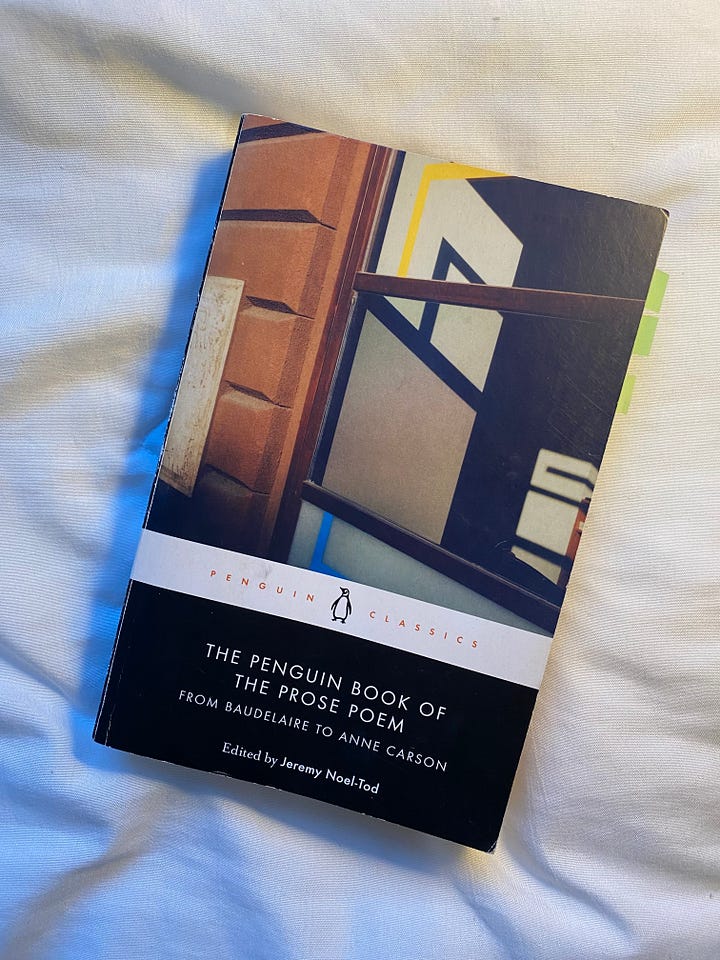
BOOKS &TC.
Maurice - E.M. Forster (1971)
This book had been on my shelf for years, but, having read and hated Where Angels Fear to Tread, Forster's first novel, I kept putting it off. When I made my reading list for 2025, I put Maurice in the queue once again, and I'm glad I did. This book is much better written than I expected; it has a great pace, the protagonist (who reminds me a bit of Newland from The Age of Innocence) is very well developed as a conflicted man who doesn't understand himself, and it has some wonderful lines (in case you've read it, Clive's chapter in Greece was my favorite).
Although it was written in 1913, Forster chose to publish it only after his death (he died in 1970), since the book centres on the homosexual romance between Maurice and Clive (which was a crime in England until 1967). As two upper-class boys who meet in Cambridge, Forster uses this aspect to criticise the platonic relationship (literally, in the philosophical sense described in The Symposium) between men as the “clean” or “dignified” version of homosexuality, exposing a romantic dichotomy between Clive and Maurice: intellectual love vs. physical love. Even though I felt that the final part lost its rhythm and became a bit repetitive and dragged on, I loved the book, and now I’m very interested in reading his other novels.
The Waste Land - T.S. Eliot (1922)
To borrow a phrase from Polonius in Hamlet, “though this be madness, yet there is method in’t”. I think this is the perfect way to describe The Waste Land. I read it back in February and was left completely bewildered. Then I reread it between April and May, this time with a reading group, and suddenly I was making sense of it once I fully embraced its fragmented nature. “A heap of broken images” is the verse that, for me, represents the key to understanding the poem. Once I learned not only to see but appreciate the polyphony in the poem, it all started to make sense. I felt like I was reading it in another language before, and now I was able to translate it to myself. There is a twisted beauty in The Waste Land, and despite its alienating character, I now believe the struggle is worth it. If you know me, you know I love a good academic challenge, so I can’t help but love Eliot’s poetry precisely because of the effort he requires from me.
Hamlet - William Shakespeare (1599-1601)
I've re-read Hamlet every year since I first read it in 2020, and this re-read was more exciting for two reasons: first, I read it with my boyfriend, who was reading it for the first time, and second, I found the play much funnier than I remembered. I think that because I was already familiar with the story, I was able to pay much more attention to the language, and thereby better appreciate Shakespeare's wordplay (an element that Harold Bloom loved to highlight as ‘equivocation’), which is unrivalled. It was worth reminding myself how good it is to reread Shakespeare; in fact, perhaps rereading is even better than reading.
A Rosa do Povo - Carlos Drummond de Andrade (1945)
It was the first time I properly read Drummond, and it was a nice surprise. This collection of poems has a relevant political context, but that's not what I want to emphasise, since the political poems were the ones I liked the least. My favourites were the poems that dealt with time, memory, nostalgia, etc. Drummond has a unique ability to evoke particular memories and make them part of the reader's consciousness, as well as a curious technique of personifying things and objectifying people — the clock tower has eyes, people are static photographs — while being equally ironic and sophisticated, without being difficult to read. Some of my favourite poems were: Indicações, Versos à boca da noite, Vida menor, Anúncio da Rosa, Idade Madura, and Desfile.
ARTICLES, ESSAYS, LECTURES
E. M. Forster and the Art and Science of the Novel - Frank Kermode (2009)
It is somewhat difficult to define what this essay is about, as Kermode (a critic I greatly admire) addresses a variety of topics. Starting from Forster's literary ‘theories’ on narrative form, he contrasts them with the views of other authors such as Henry James, Ford Madox Ford, and modern narratology scholars such as Tzvetan Todorov. It is an extremely informative and accessible text for beginners, and is particularly interesting for those who appreciate or study early modernist English literature, as Kermode analyses the main narratological innovations that took place during this period (with many examples), and how Forster fits into it.
Thinking in Dark Times - Julia Kristeva (2006)
Kristeva discusses the crisis of belief that religion can no longer satisfy and the role of politics and the humanities in this postmodern scenario. She explains that our model of the ‘public intellectual’ still largely follows the guidelines developed in the 18th century when this figure first emerged. The institutionalisation of humanities as an academic discipline has sidelined the study of theology and philosophy, that is, of the divine and the (abstractly) human, replacing it with the analysis of social bonds, structures of affinity, rites and myths, psychic life and the genesis of languages and written works. From this, she asks: Does our understanding of humanism still have a place in our world, shrouded in religious wars and technology?
“The public intellectual" is only a variant, sometimes pertinent, sometimes hackneyed, of this radical reshuffling of Western thought that has been going on for more than two centuries. Is it now condemned to disappear beneath the empire of images, dragging down with it this whole economy of thought we call the humanities? This question underlies the crisis of culture and also, concretely, the menacing job crisis our disciplines are now facing.
On Literary Evolution: An Interview with Stéphane Mallarmé (1891)
Mallarmé, one of the great French poets of the fin-de-siècle, welcomed the change that was taking place in poetry: a liberation from rigid and formal precepts that dictated how a verse should be written, in favour of a more encompassing and impressionistic poetry. He explains that “the attempts of the most recent [poems] do not tend to suppress the classical line; they tend, instead, to breathe more air into the poem, to create a kind of fluidity, a mobility between the lines of the classical flow, which was lacking until now”.
It is interesting to see how much of Mallarmé's perspective still applies to postmodern art; however, in my opinion, we have already freshened up and modernised the literary form so much that much of it has lost its meaning, becoming “deconstructed for the sake of being deconstructed” and failing to say anything concrete with so much deconstruction. I think it is valid to go a little in the opposite direction, towards a rescue of form, to remember what we are contradicting and thus do so in a meaningful way.
Above all, this indubitable idea was lacking: that, in a society that is unstable and un-unified, no stable art, no definitive art, can be created. Out of this unachieved social order, which explains at the same time the spiritual restlessness, is born the unexplained need of individuality whose present literary manifestations are the direct reflection.
FILMS & SERIES
Ran - Akira Kurosawa (1985)
I saw someone on Letterboxd saying that watching this film was like seeing colours for the first time, and that's exactly what I felt. Each scene is ridiculously well shot; the intentionality in the style is evident, and the exuberant visuals reinforce the fable-like aspect of the narrative, inspired by King Lear. The performance of Tatsuya Nakadai—who plays Lear—is impressive, and was my favourite element apart from the film's cinematography. I won't give any spoilers, but there is a battle scene in which the sound of screams and explosions has been replaced by orchestral music (macabre and dreamlike), and it is honestly one of the best things I have ever seen. It is Shakespeare, yes, in essence, but at the same time, it is a story that stands on its own. That's what a good adaptation is all about. Everything in this film is impressive, and I would give anything to see it again in IMAX.
Dreams (Sex Love) - Dag Johan Haugerud (2024)
As part of the Imovision film festival, I went to see this film alone on a Sunday without expecting much from it. It was funnier and smarter than I thought it would be, but still boring overall. It is the story of a teenager who falls in love with a teacher and ends up writing a book about this relationship. From there, the film begins some interesting discussions about consent, age gaps, and the choices made in autofiction, but never finishes them. It's as if the script raises points and never leads them to a concrete idea. I left the cinema without knowing what Haugerud wanted to say.
The Purple Rose of Cairo - Woody Allen (1985)
It was Wednesday afternoon and I was bored and needed a laugh, so I decided to watch this film. Unfortunately, it didn't work for me as I had hoped. I found the jokes repetitive and the script weak, especially compared to other Allen films from the same period. The Purple Rose of Cairo is a magical realism narrative set during the Great Depression in the United States. Mia Farrow plays a woman obsessed with the cinema, who one day decides to watch the same film five times. On the fifth time, one of the characters in the film turns to talk to her and steps out of the movie screen into the real world. This sets off a comical chase to return this character to the film so that the story can continue. Here, Allen explores one of his favourite themes: the individual choice between romantic fantasy and prosaic reality.
Almost Famous - Cameron Crowe (2000)
I love, love, love this film, and it was great to watch it again on my birthday. With a spectacular soundtrack, Almost Famous is the story of an aspiring teenage music critic in the 1970s who embarks on a tour with the band Stillwater. For me, this is a comfort movie; I love the vintage aesthetic, the nostalgic atmosphere and the lighthearted narrative.
American Psycho - Mary Harron (2000)
I didn't remember this film being so good, and it was great to confirm that it lives up to the hype and that I need to read Bret Easton Ellis' book. The downward spiral into madness in the second half is the best aspect of American Psycho; it's camp, entertainingly confusing and astute, and completely avoids the clichés of serial killer films. It's a shame that the film suffered a bit from the Fight Club effect, that is, it was misinterpreted by toxic straight men who admire Patrick Bateman and think he's “cool” instead of realising that this is a parody and that they are also the butt of the joke, and the fact that they don't realise this is what makes it all a bit pathetic.
The Nice Guys - Shane Black (2016)
I would classify The Nice Guys as a “boy's film,” which is usually a negative for me, but in this case it wasn't. It's a lot of fun and perfectly fulfils its intended purpose: to be an entertaining detective comedy with a sufficiently interesting mystery (and a good balance of action scenes, which I usually find boring) — all without treating the viewer like an idiot. Ryan Gosling is an excellent comedy actor, I want to see him clowning around more.
In the Mood of Love - Wong Kar-Wai (2000)
Another film I rewatched this month after years, and it managed to be even more magnificent the second time around. I watched it with my boyfriend and we commented on how Wong Kar-Wai has a very unique style that might not work if he weren't so brilliant. Many of the visual choices he makes, such as slow motion, the use of reflections in mirrors and not showing the faces of some characters, the somewhat abrupt cuts, are what make the film so visually unforgettable. I love restrained dramas, and this story of unrequited romance breaks my heart every time.
Girlfriends - Claudia Weill (1978)
I hate to use this word in a non-ironic way, but this is, in fact, a quirky film. There is no better adjective to describe this story about two friends living in New York, equally lost and with very different perspectives on life. It is funny and very realistic, no wonder it inspired Lena Dunham and served as the basis for Frances Ha.
Rosenctrantz and Guildenstern are Dead - Tom Stoppard (1990)
We have over 400 years of adaptations and reinterpretations of Hamlet available, and among everything I've seen, this film is an ideal example of what it means to reimagine a text while remaining faithful to it and at the same time managing to expand it. This brilliant film — written and directed by Tom Stoppard, who is also a very competent playwright — is based on the following hypothesis: what would it be like to see Hamlet from the point of view of these strange, bland secondary characters, aka Rosencrantz and Guildenstern? The text is a succession of puns and jokes that are both clever and silly; I also noticed an influence from Beckett and Monty Python. Tim Roth and Gary Oldman are a sensational duo, and the film is only as good as it is because of them.
MUSIC & PODCASTS
Crying, Laughing, Loving, Lying - Labi Siffre (1972)
This album is very special to me and perfectly illustrates a type of love that I admire (or find ‘right’ on some level). Folk/Folk Rock is, nowadays, the musical genre I listen to and enjoy the most. Labi Siffre is one of the best artists in the genre, and I don't see many people talking about him, which is a shame. Listen to this album, it's beautiful. Favourite songs: Blue Lady; Crying, Laughing, Loving, Lying; My Song; 'Till Forever; Watch Me.
Lifetime - Erika de Casier (2025)
I am always delighted when I find something that lives up to the hype. I had seen some people praising and recommending Erika de Casier's new album, and it really is incredible. It is rare to find music today that I consider different or at least with a very distinctive style, and this is one of those rare cases. It seems to be influenced by artists such as Portishead and Imogen Heap, but it is still unique. Favourite songs: Seasons; December; Two Thieves; Lifetime.
Uncanny - Why Theory Podcast
‘The Uncanny’ is one of Freud's most famous essays, and a very relevant concept to keep in mind when analysing narratives. Why Theory is one of my favourite podcasts on philosophy and psychoanalysis, and in this episode they analyse this Freudian concept by applying it to various examples. ‘Uncanny is a disquieting recurrence of the familiar’ is the definition presented. They explain that the uncanny is not just a fear of the unknown, but rather a fear of the unknown within (that is, as part or an integral component) of what was supposed to be known/familiar, such as finding something strange and not recognising it in the self or in one's own psyche.
The Road to 1066: Anglo-Saxon Apocalypse (series) - The Rest is History Podcast
I love listening to podcasts about history (especially medieval history) while doing household chores, and The Rest is History series is currently my favourite. This series contextualises the Norman conquest of England in 1066, explaining the political tensions at play and attempting to establish why the conquest happened the way it did. I find this period extremely interesting, and I particularly enjoy studying the history of England during this period.




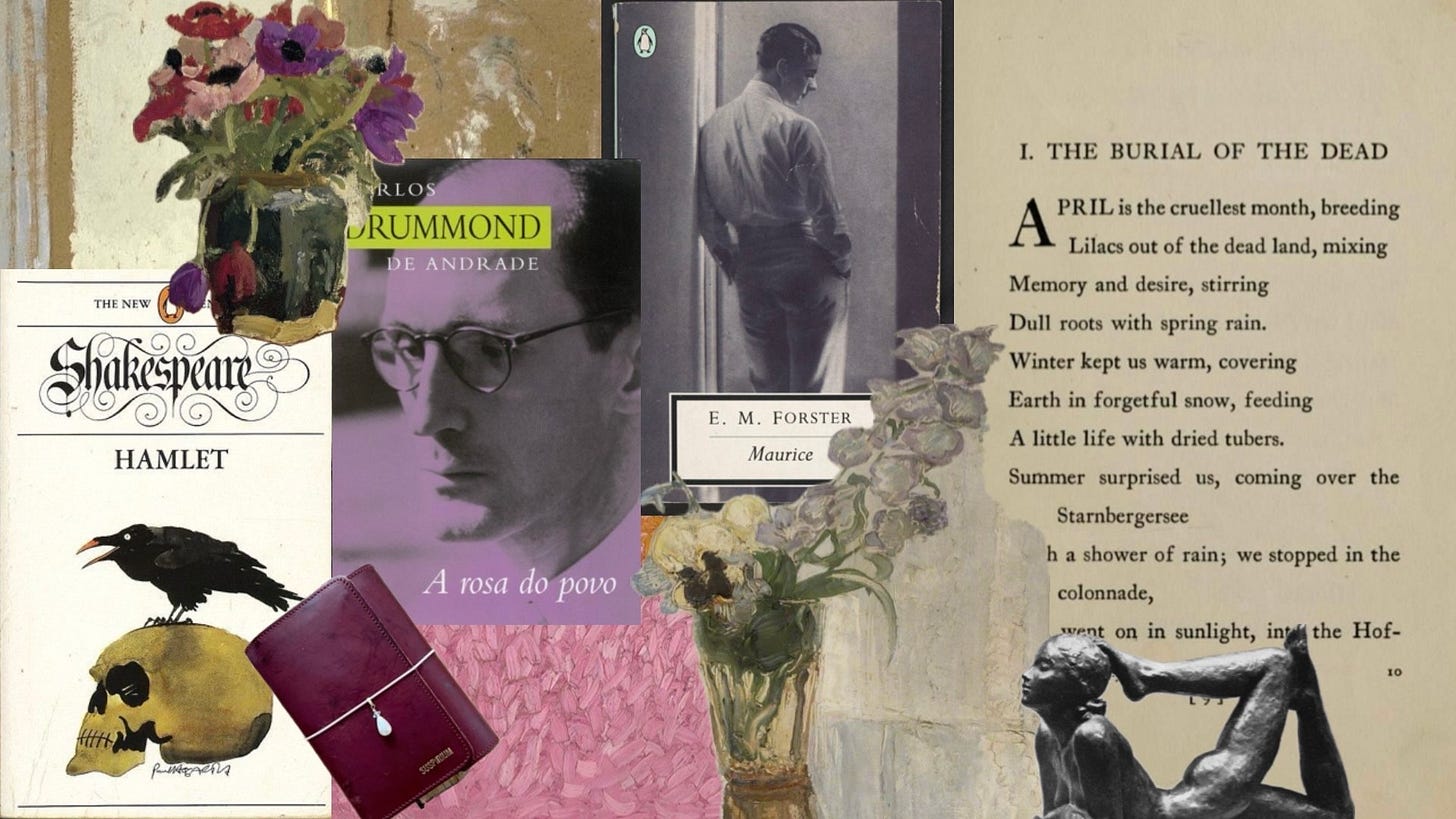
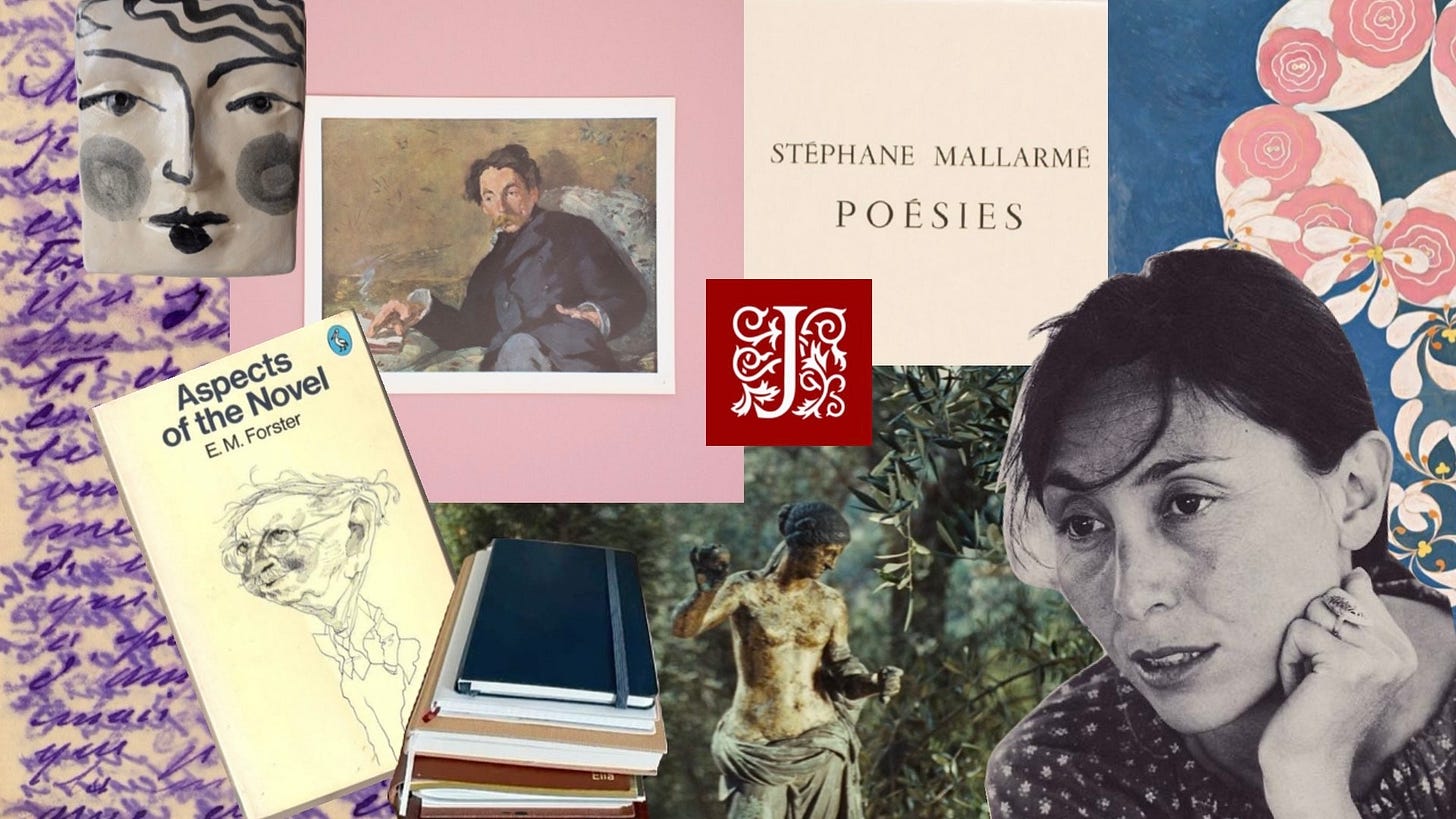

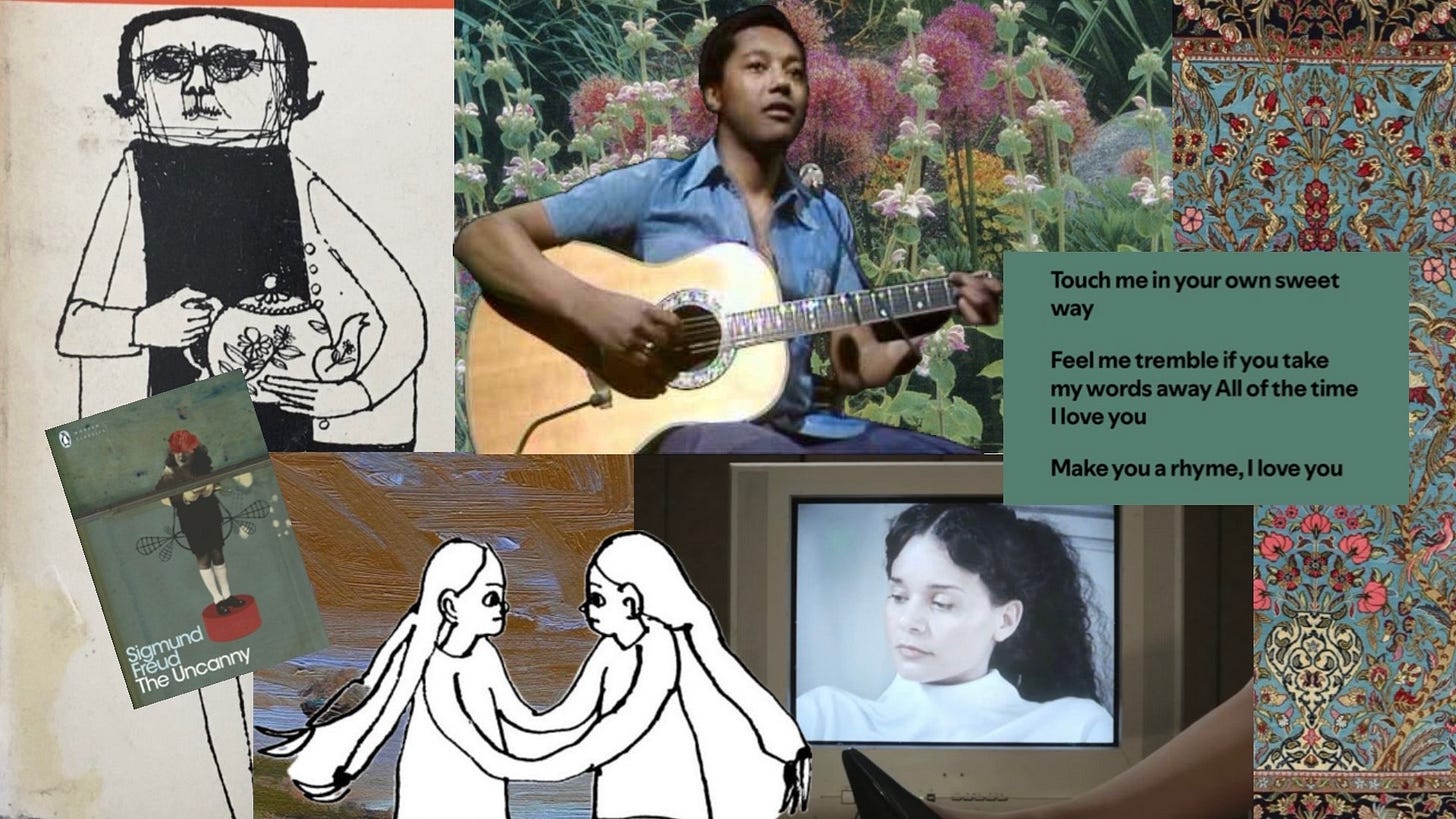

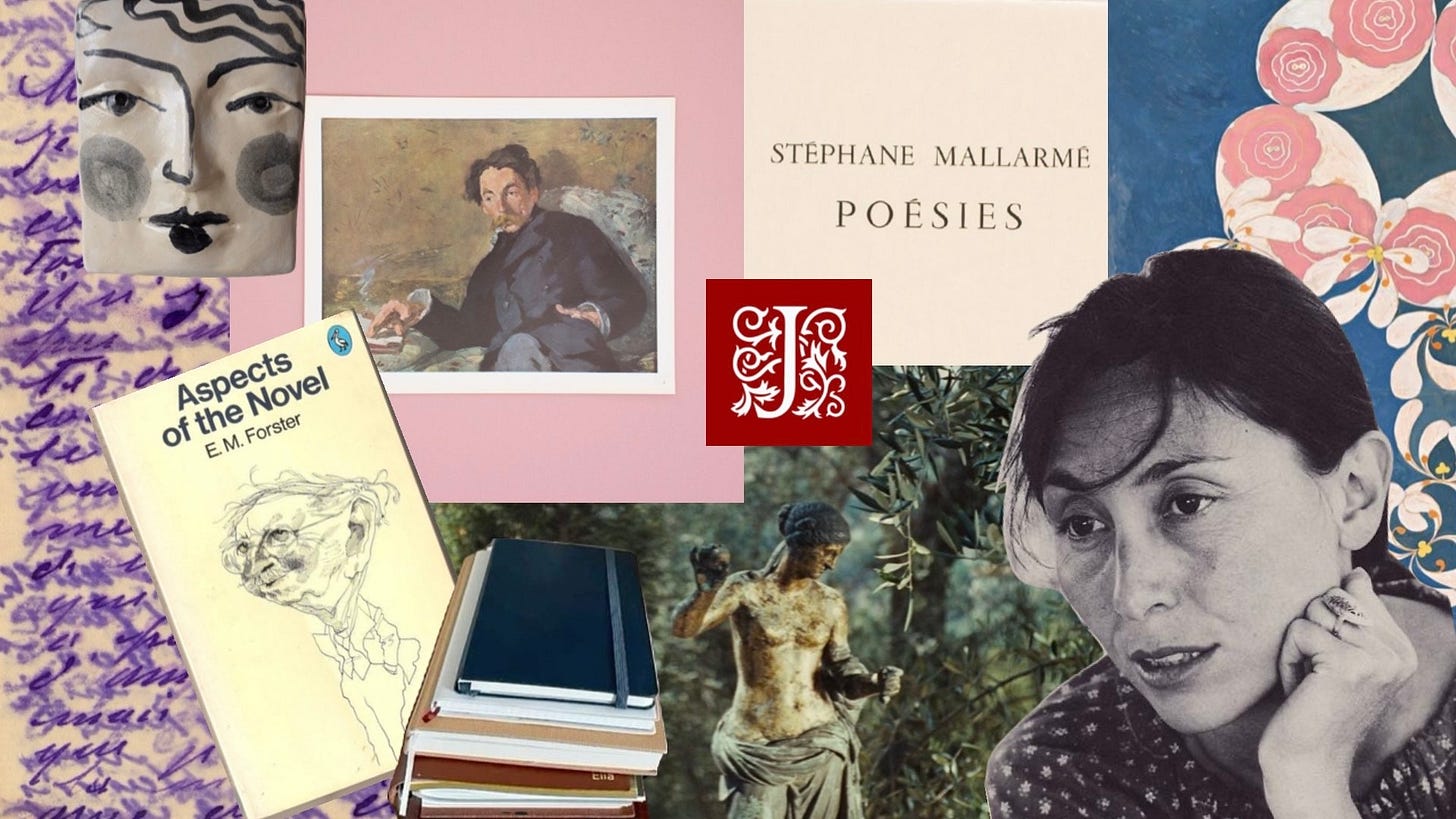
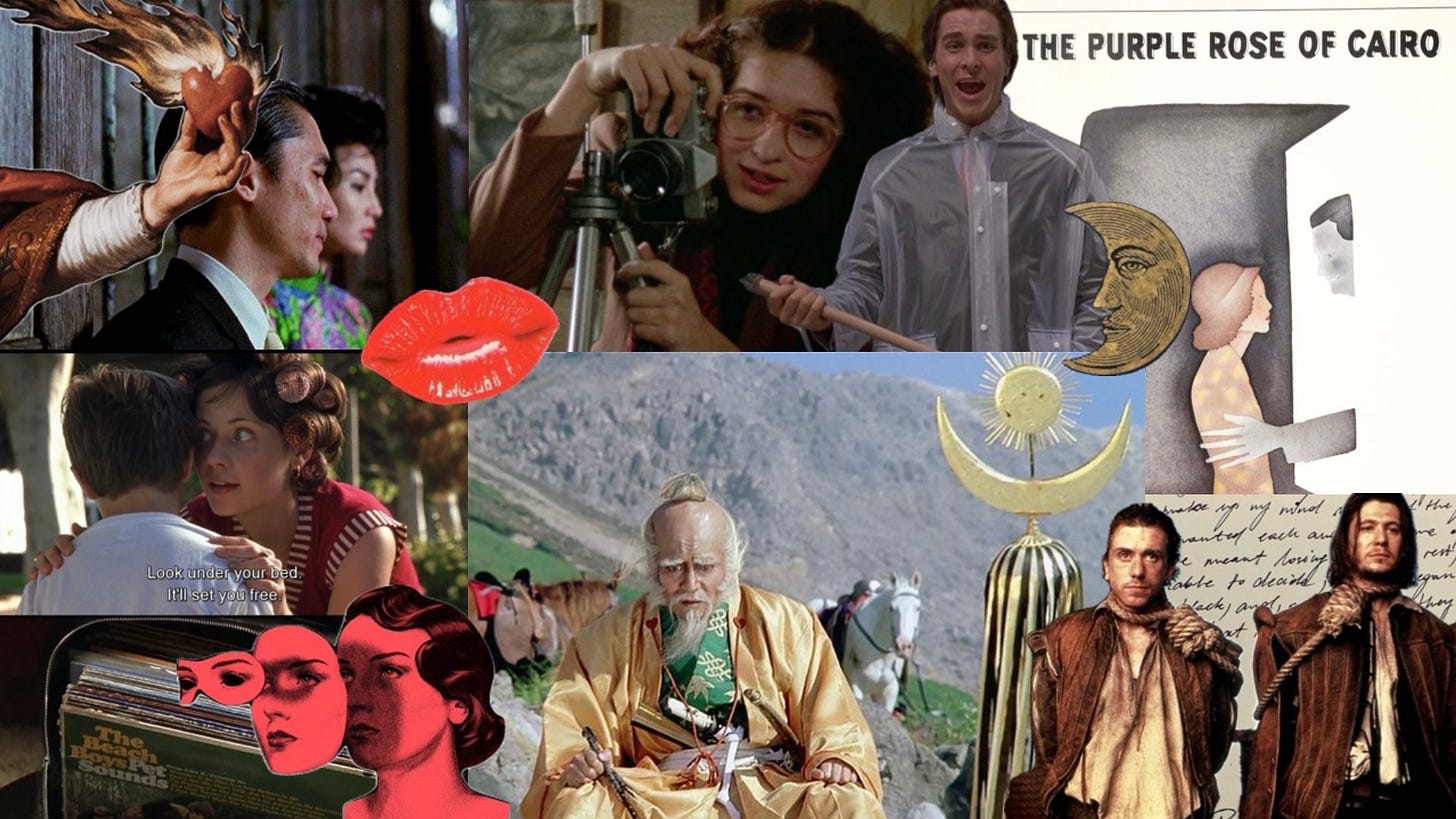
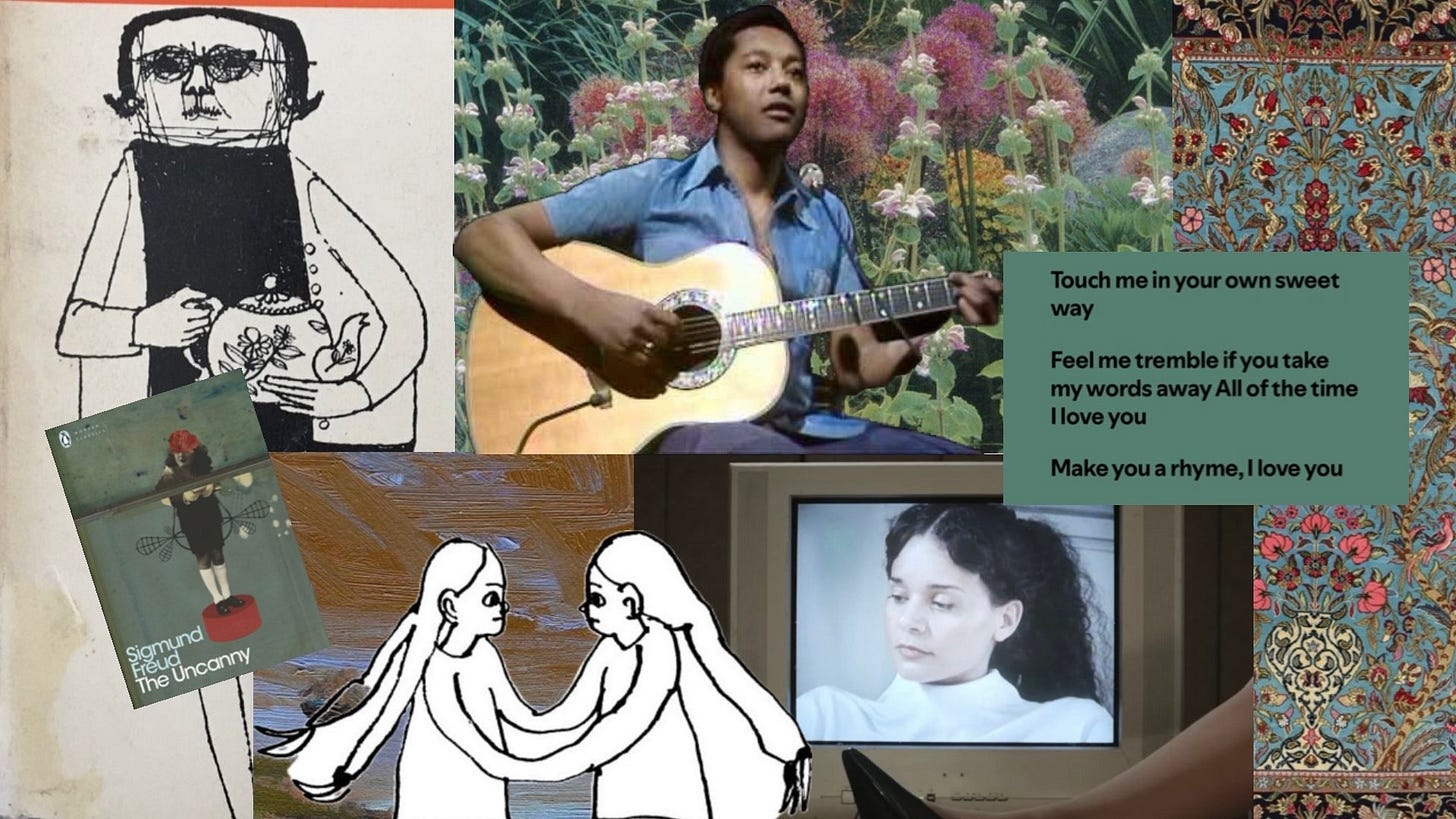
Que legal. Gostei bastante do teu formato "apanhados do mês".
Agora sobre os comentários propriamente ditos: nunca li o Forster (shame, shame) e pensei em começar com A room with a view, mas quem sabe eu comece pelo Maurice então. Fiquei curiosa com o filme do Tom Stoppard porque eu nunca tinha ouvido falar. Sobre a Rosa púrpura, eu assisti há uns 20 anos -- ou seja, era uma adolescente -- e lembro de ter gostado na época. Já visse Alice, também dele com a Mia Farrow? Tem essa pegada meio realismo mágico também, mas accho que é melhor.
Almost Famous is a top four film of all time for me 👌🏼